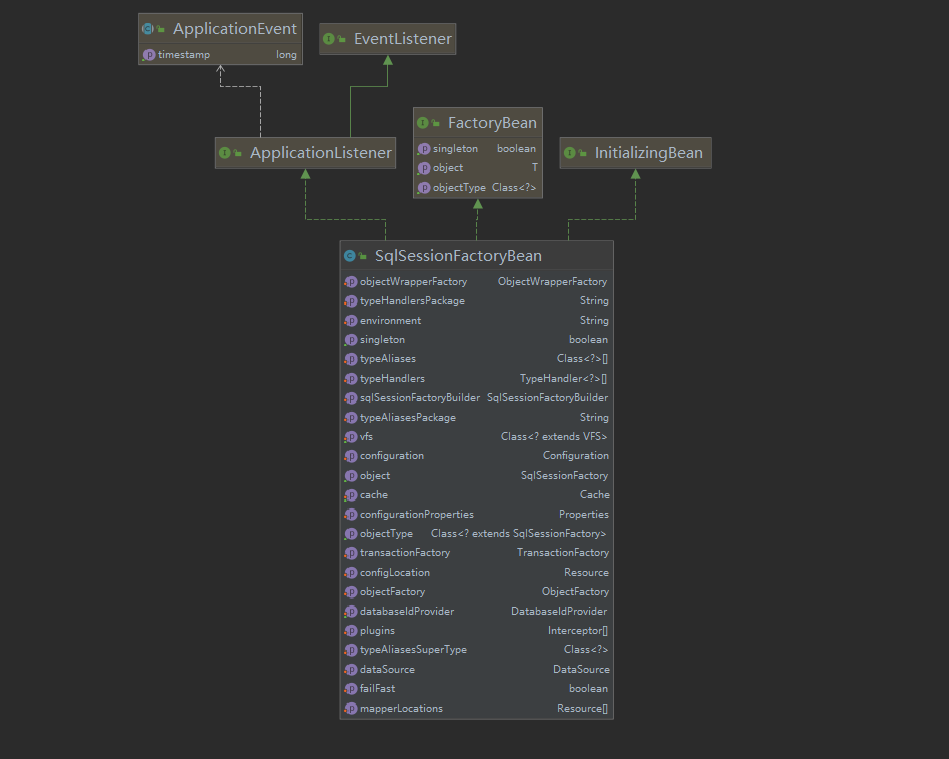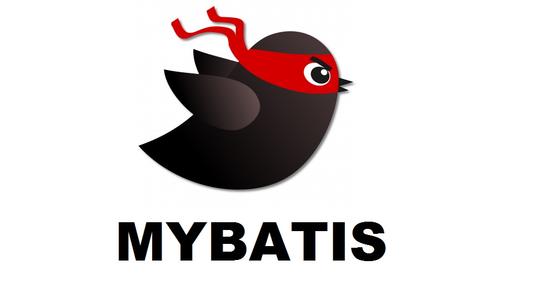前言
上一章中【MyBatis源码学习】MyBatis与Spring整合,我们介绍了Mybatis与Spring、Spring Boot的融合,其中我们提到了mybatis-spring中的几个关键类,本章我们来跟踪下这几个关键类的源码,看看它们干了些啥.
一、源码下载
和mybatis源码下载一样,从GitHub下载好后,本地打包部署一下,方便我们后面进行测试时方便查看。源码地址:这里是MyBatis-Spring源码地址.
二、核心类源码解析
先来回顾下核心类的功能:
- SqlSessionFactoryBean:用于创建SqlSessionFactory;
- MapperScannerConfigurer:自动扫描所有的 Mapper 接口,使用时可以直接注入接口。
1.SqlSessionFactoryBean
(1) UML
"SqlSessionFactoryBean"
(2) 配置和源码解析
通常我们在项目中整合Spring和mybatis时,Spring相关的配置文件会包含:
<!-- spring和MyBatis完美整合,不需要mybatis的配置映射文件 -->
<bean id="sqlSessionFactory" class="org.mybatis.spring.SqlSessionFactoryBean">
<property name="dataSource" ref="dataSource" />
<property name="typeAliasesPackage" value="com.enjoylearning.mybatis.entity" />
<property name="mapperLocations" value="classpath:sqlmapper/*.xml" />
</bean>并且dataSource必须配置,我们可以从方法afterPropertiesSet()看出来:
/**
* 在spring容器中创建全局唯一的sqlSessionFactory
*
* @throws Exception 异常
*/
@Override
public void afterPropertiesSet() throws Exception {
//数据源不能为空
notNull(dataSource, "Property 'dataSource' is required");
//sqlSessionFactoryBuilder不能为空,但初始化SqlSessionFactoryBean完,sqlSessionFactoryBuilder已经创建了
notNull(sqlSessionFactoryBuilder, "Property 'sqlSessionFactoryBuilder' is required");
state((configuration == null && configLocation == null) || !(configuration != null && configLocation != null),
"Property 'configuration' and 'configLocation' can not specified with together");
this.sqlSessionFactory = buildSqlSessionFactory();
}接下来,看看方法。主要功能构建和丰富Configuration,并创建sqlSessionFactory.
/**
* Build a {@code SqlSessionFactory} instance.
*
* The default implementation uses the standard MyBatis {@code XMLConfigBuilder} API to build a
* {@code SqlSessionFactory} instance based on an Reader.
* Since 1.3.0, it can be specified a {@link Configuration} instance directly(without config file).
*
* @return SqlSessionFactory
* @throws IOException if loading the config file failed
*/
protected SqlSessionFactory buildSqlSessionFactory() throws IOException {
Configuration configuration;
XMLConfigBuilder xmlConfigBuilder = null;
//如果configuration不为空,则使用该对象,并对其进行配置
if (this.configuration != null) {
configuration = this.configuration;
if (configuration.getVariables() == null) {
configuration.setVariables(this.configurationProperties);
} else if (this.configurationProperties != null) {
configuration.getVariables().putAll(this.configurationProperties);
}
//创建xmlConfigBuilder,读取mybatis的核心配置文件
} else if (this.configLocation != null) {
xmlConfigBuilder = new XMLConfigBuilder(this.configLocation.getInputStream(), null, this.configurationProperties);
configuration = xmlConfigBuilder.getConfiguration();
//如果configuration为空,实例化一个configuration对象
} else {
if (LOGGER.isDebugEnabled()) {
LOGGER.debug("Property 'configuration' or 'configLocation' not specified, using default MyBatis Configuration");
}
configuration = new Configuration();
if (this.configurationProperties != null) {
configuration.setVariables(this.configurationProperties);
}
}
//设置objectFactory
if (this.objectFactory != null) {
configuration.setObjectFactory(this.objectFactory);
}
//设置objectWrapperFactory
if (this.objectWrapperFactory != null) {
configuration.setObjectWrapperFactory(this.objectWrapperFactory);
}
//设置vfs
if (this.vfs != null) {
configuration.setVfsImpl(this.vfs);
}
//扫描指定的包typeAliasesPackage,注册别名
if (hasLength(this.typeAliasesPackage)) {
String[] typeAliasPackageArray = tokenizeToStringArray(this.typeAliasesPackage, ConfigurableApplicationContext.CONFIG_LOCATION_DELIMITERS);
for (String packageToScan : typeAliasPackageArray) {
configuration.getTypeAliasRegistry().registerAliases(packageToScan, typeAliasesSuperType == null ? Object.class : typeAliasesSuperType);
if (LOGGER.isDebugEnabled()) {
LOGGER.debug("Scanned package: '" + packageToScan + "' for aliases");
}
}
}
//为typeAliases指定的类注册别名
if (!isEmpty(this.typeAliases)) {
for (Class<?> typeAlias : this.typeAliases) {
configuration.getTypeAliasRegistry().registerAlias(typeAlias);
if (LOGGER.isDebugEnabled()) {
LOGGER.debug("Registered type alias: '" + typeAlias + "'");
}
}
}
//注册插件
if (!isEmpty(this.plugins)) {
for (Interceptor plugin : this.plugins) {
configuration.addInterceptor(plugin);
if (LOGGER.isDebugEnabled()) {
LOGGER.debug("Registered plugin: '" + plugin + "'");
}
}
}
//扫描指定的包typeHandlersPackage,注册类型解析器
if (hasLength(this.typeHandlersPackage)) {
String[] typeHandlersPackageArray = tokenizeToStringArray(this.typeHandlersPackage, ConfigurableApplicationContext.CONFIG_LOCATION_DELIMITERS);
for (String packageToScan : typeHandlersPackageArray) {
configuration.getTypeHandlerRegistry().register(packageToScan);
if (LOGGER.isDebugEnabled()) {
LOGGER.debug("Scanned package: '" + packageToScan + "' for type handlers");
}
}
}
//为typeHandlers指定的类注册类型解析器
if (!isEmpty(this.typeHandlers)) {
for (TypeHandler<?> typeHandler : this.typeHandlers) {
configuration.getTypeHandlerRegistry().register(typeHandler);
if (LOGGER.isDebugEnabled()) {
LOGGER.debug("Registered type handler: '" + typeHandler + "'");
}
}
}
//配置databaseIdProvider
//fix #64 set databaseId before parse mapper xmls
if (this.databaseIdProvider != null) {
try {
configuration.setDatabaseId(this.databaseIdProvider.getDatabaseId(this.dataSource));
} catch (SQLException e) {
throw new NestedIOException("Failed getting a databaseId", e);
}
}
//配置缓存
if (this.cache != null) {
configuration.addCache(this.cache);
}
//使用xmlConfigBuilder读取mybatis的核心配置文件
if (xmlConfigBuilder != null) {
try {
xmlConfigBuilder.parse();
if (LOGGER.isDebugEnabled()) {
LOGGER.debug("Parsed configuration file: '" + this.configLocation + "'");
}
} catch (Exception ex) {
throw new NestedIOException("Failed to parse config resource: " + this.configLocation, ex);
} finally {
ErrorContext.instance().reset();
}
}
//默认使用SpringManagedTransactionFactory作为事务管理器
if (this.transactionFactory == null) {
this.transactionFactory = new SpringManagedTransactionFactory();
}
//设置Environment
configuration.setEnvironment(new Environment(this.environment, this.transactionFactory, this.dataSource));
//根据mapperLocations的配置,处理映射配置文件以及相应的mapper接口
if (!isEmpty(this.mapperLocations)) {
for (Resource mapperLocation : this.mapperLocations) {
if (mapperLocation == null) {
continue;
}
try {
XMLMapperBuilder xmlMapperBuilder = new XMLMapperBuilder(mapperLocation.getInputStream(), configuration, mapperLocation.toString(), configuration.getSqlFragments());
xmlMapperBuilder.parse();
} catch (Exception e) {
throw new NestedIOException("Failed to parse mapping resource: '" + mapperLocation + "'", e);
} finally {
ErrorContext.instance().reset();
}
if (LOGGER.isDebugEnabled()) {
LOGGER.debug("Parsed mapper file: '" + mapperLocation + "'");
}
}
} else {
if (LOGGER.isDebugEnabled()) {
LOGGER.debug("Property 'mapperLocations' was not specified or no matching resources found");
}
}
//最终使用sqlSessionFactoryBuilder创建sqlSessionFactory
return this.sqlSessionFactoryBuilder.build(configuration);
}最后一句
return this.sqlSessionFactoryBuilder.build(configuration);是不是又回到了熟悉的地方。
2.MapperScannerConfigurer
(1) UML
"MapperScannerConfigurer UML"
(2) 配置和源码解析
这里我们主要关注这个接口:BeanDefinitionRegistryPostProcessor
MapperScannerConfigurer实现了BeanDefinitionRegistryPostProcessor接口,BeanDefinitionRegistryPostProcessor接口是一个可以修改spring工厂中已定义的bean的接口,该接口有个postProcessBeanDefinitionRegistry方法。
@Override
public void postProcessBeanDefinitionRegistry(BeanDefinitionRegistry registry) {
//占位符处理
if (this.processPropertyPlaceHolders) {
processPropertyPlaceHolders();
}
//实例化ClassPathMapperScanner,并对scanner相关属性进行配置
ClassPathMapperScanner scanner = new ClassPathMapperScanner(registry);
scanner.setAddToConfig(this.addToConfig);
scanner.setAnnotationClass(this.annotationClass);
scanner.setMarkerInterface(this.markerInterface);
scanner.setSqlSessionFactory(this.sqlSessionFactory);
scanner.setSqlSessionTemplate(this.sqlSessionTemplate);
scanner.setSqlSessionFactoryBeanName(this.sqlSessionFactoryBeanName);
scanner.setSqlSessionTemplateBeanName(this.sqlSessionTemplateBeanName);
scanner.setResourceLoader(this.applicationContext);
scanner.setBeanNameGenerator(this.nameGenerator);
//根据上述配置,生成过滤器,只扫描合条件的class
scanner.registerFilters();
//扫描指定的包以及其子包
scanner.scan(StringUtils.tokenizeToStringArray(this.basePackage, ConfigurableApplicationContext.CONFIG_LOCATION_DELIMITERS));
}点进去,看看ClassPathMapperScanner.scan()方法:
/**
* Calls the parent search that will search and register all the candidates.
* Then the registered objects are post processed to set them as
* MapperFactoryBeans
*/
@Override
public Set<BeanDefinitionHolder> doScan(String... basePackages) {
//通过父类ClassPathBeanDefinitionScanner的扫描,获取所有复合条件的BeanDefinitionHolder对象
Set<BeanDefinitionHolder> beanDefinitions = super.doScan(basePackages);
if (beanDefinitions.isEmpty()) {
logger.warn("No MyBatis mapper was found in '" + Arrays.toString(basePackages) + "' package. Please check your configuration.");
} else {
//处理扫描得到的BeanDefinitionHolder集合,将集合中的每一个mapper接口转换成MapperFactoryBean后,注册至spring容器
processBeanDefinitions(beanDefinitions);
}
return beanDefinitions;
}
/**
* 处理扫描得到的BeanDefinitionHolder集合,将集合中的每一个mapper接口转换成MapperFactoryBean后,注册至spring容器
*
* @param beanDefinitions
*/
private void processBeanDefinitions(Set<BeanDefinitionHolder> beanDefinitions) {
GenericBeanDefinition definition;
//遍历集合
for (BeanDefinitionHolder holder : beanDefinitions) {
definition = (GenericBeanDefinition) holder.getBeanDefinition();
if (logger.isDebugEnabled()) {
logger.debug("Creating MapperFactoryBean with name '" + holder.getBeanName()
+ "' and '" + definition.getBeanClassName() + "' mapperInterface");
}
// the mapper interface is the original class of the bean
// but, the actual class of the bean is MapperFactoryBean
//增加一个构造方法,接口类型作为构造函数的入参
definition.getConstructorArgumentValues().addGenericArgumentValue(definition.getBeanClassName());
//将bean的类型转换成mapperFactoryBean
definition.setBeanClass(this.mapperFactoryBean.getClass());
//增加addToConfig属性
definition.getPropertyValues().add("addToConfig", this.addToConfig);
boolean explicitFactoryUsed = false;
//增加sqlSessionFactory属性
if (StringUtils.hasText(this.sqlSessionFactoryBeanName)) {
definition.getPropertyValues().add("sqlSessionFactory", new RuntimeBeanReference(this.sqlSessionFactoryBeanName));
explicitFactoryUsed = true;
} else if (this.sqlSessionFactory != null) {
definition.getPropertyValues().add("sqlSessionFactory", this.sqlSessionFactory);
explicitFactoryUsed = true;
}
//增加sqlSessionTemplate属性
if (StringUtils.hasText(this.sqlSessionTemplateBeanName)) {
if (explicitFactoryUsed) {
logger.warn("Cannot use both: sqlSessionTemplate and sqlSessionFactory together. sqlSessionFactory is ignored.");
}
definition.getPropertyValues().add("sqlSessionTemplate", new RuntimeBeanReference(this.sqlSessionTemplateBeanName));
explicitFactoryUsed = true;
} else if (this.sqlSessionTemplate != null) {
if (explicitFactoryUsed) {
logger.warn("Cannot use both: sqlSessionTemplate and sqlSessionFactory together. sqlSessionFactory is ignored.");
}
definition.getPropertyValues().add("sqlSessionTemplate", this.sqlSessionTemplate);
explicitFactoryUsed = true;
}
//修改自动注入的方式 bytype
if (!explicitFactoryUsed) {
if (logger.isDebugEnabled()) {
logger.debug("Enabling autowire by type for MapperFactoryBean with name '" + holder.getBeanName() + "'.");
}
definition.setAutowireMode(AbstractBeanDefinition.AUTOWIRE_BY_TYPE);
}
}
}注释已经写得很清楚了,这里再看看MapperFactoryBean.

MapperFactoryBean
其继承了SqlSessionDaoSupport类,SqlSessionDaoSupport类继承DaoSupport抽象类,DaoSupport抽象类实现了InitializingBean接口,因此实例一个MapperFactoryBean的时候,都会调用InitializingBean接口的afterPropertiesSet方法。而MapperFactoryBean也重写了:
/**
* MapperFactoryBean在容器初始化时,要确保mapper接口被注册到mapperRegistry
* {@inheritDoc}
*/
@Override
protected void checkDaoConfig() {
super.checkDaoConfig();
notNull(this.mapperInterface, "Property 'mapperInterface' is required");
//通过SqlSession从容器中拿到configuration
Configuration configuration = getSqlSession().getConfiguration();
if (this.addToConfig && !configuration.hasMapper(this.mapperInterface)) {
try {
//如果mapperRegistry中不包含当前接口的动态代理工厂,则添加一个
configuration.addMapper(this.mapperInterface);
} catch (Exception e) {
logger.error("Error while adding the mapper '" + this.mapperInterface + "' to configuration.", e);
throw new IllegalArgumentException(e);
} finally {
ErrorContext.instance().reset();
}
}
}看到configuration.addMapper()方法,是不是又想起了configuration熟悉的味道了。
MapperScannerConfigurer在Spring配置文件中的应用如下:
<!-- DAO接口所在包名,Spring会自动查找其下的类 -->
<bean class="org.mybatis.spring.mapper.MapperScannerConfigurer">
<!-- 可以使用分号或逗号作为分隔符设置多于一个的包路径 -->
<property name="basePackage" value="com.enjoylearning.mybatis.mapper" />
<!-- optional unless there are multiple session factories defined -->
<property name="sqlSessionFactoryBeanName" value="sqlSessionFactory" />
</bean>作用很简单,扫描特定目录下的所有mapper.java,生成MapperFactoryBean,然后创建动态代理工厂类MapperProxyFactory,并注册至mapperRegistry当中。使用时依赖注入即可。
当然,如果只有一个mapper,我们也可以这样配置:
<bean id="tUserMapper" class="org.mybatis.spring.mapper.MapperFactoryBean">
<property name="mapperInterface" value="com.enjoylearning.mybatis.mapper.TUserMapper" />
<property name="sqlSessionFactory" ref="sqlSessionFactory" />
</bean>但是,一般项目中mapper肯定不止一个,一旦新增了一个新的mapper,我们就需要配置很多个这样子的bean,MapperScannerConfigurer帮我们解决了这样的问题。
sqlSessionFactoryBeanName非必填,但是如果是多数据源的环境,就必须配置好。注意 bean 的名称name是必须的,而不是 bean 的引用,因此,value 属性在这里替代通常的ref。



